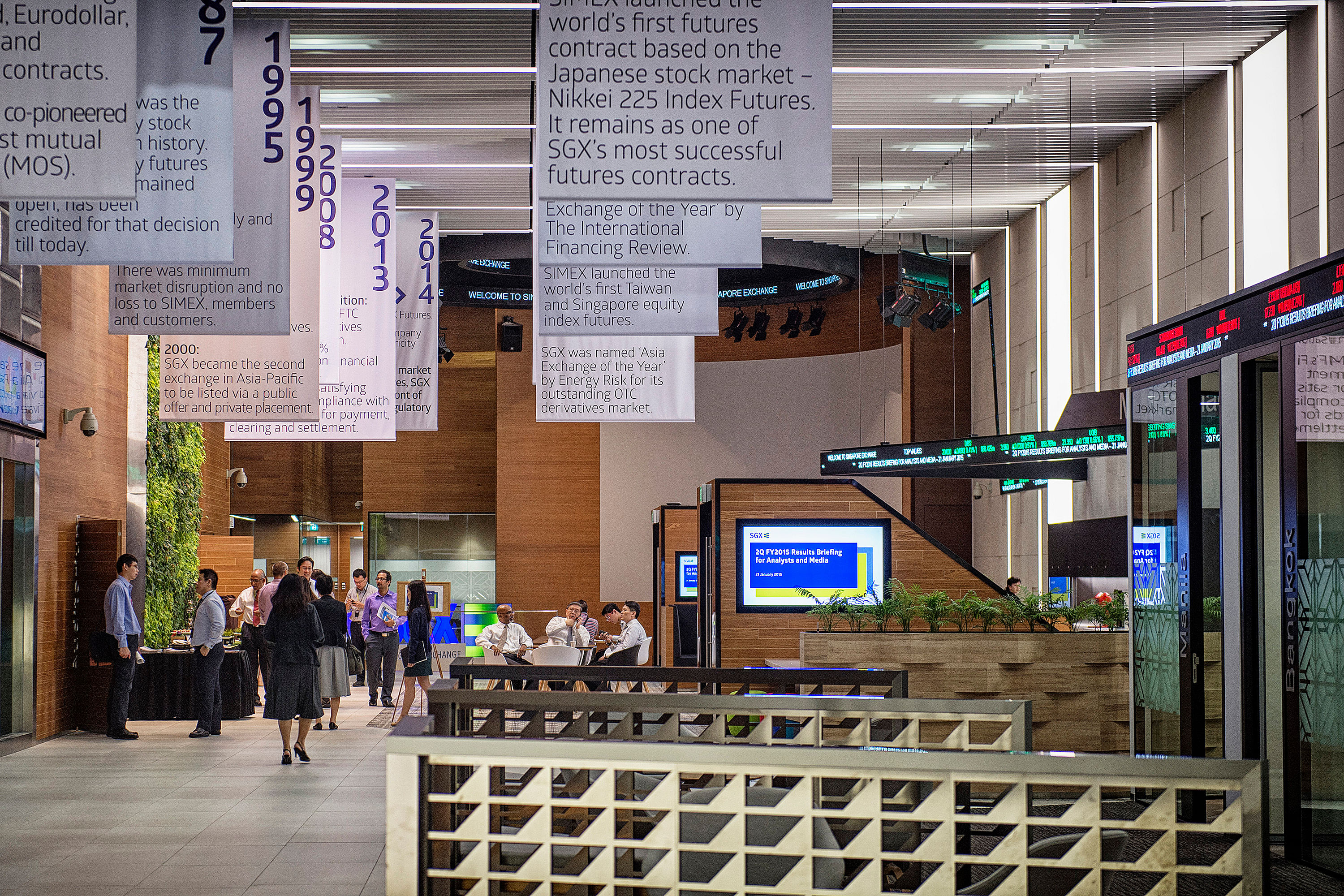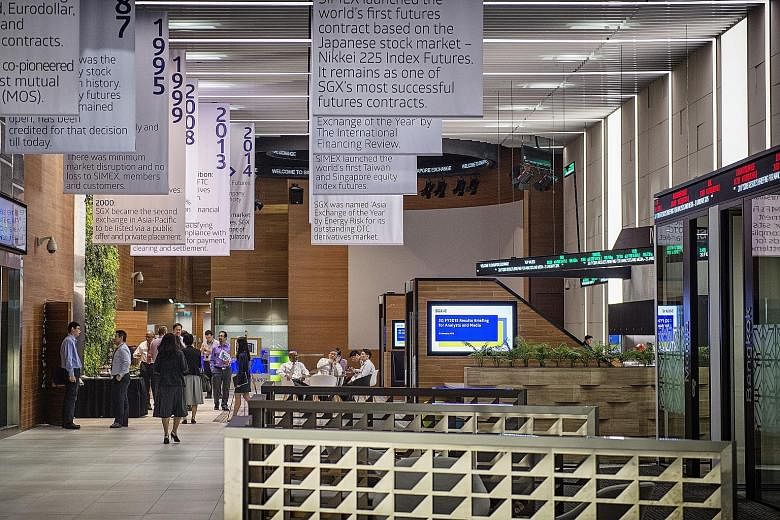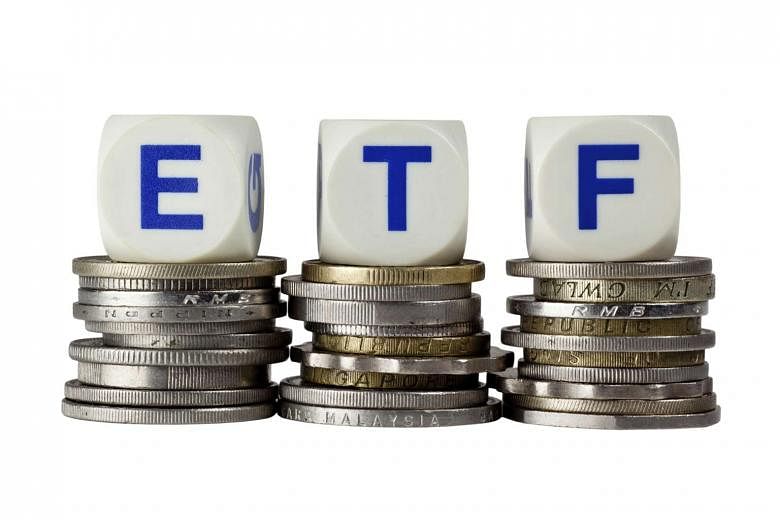ETFs: Passive tracking and lower costs
Amid a constant threat of volatility, investors are seeking low-cost ways to gain broad market exposure as well as diversification.
Yet only a small - though growing - band of retail investors in Singapore are aware that exchange-traded funds (ETFs) could help them do just that. Interest in ETFs has been lukewarm and analysts say the key is to press on with investor education campaigns.
"I think the understanding of ETFs in Singapore is very low. I sense if you were to do a straw poll and speak to the average person on the street and ask them what is an ETF, they probably wouldn't know," said Mr Kevin Hardy, BlackRock country head of Singapore and head of beta strategies in the Asia-Pacific.
This is despite the fact that both the Singapore Exchange (SGX) and MoneySense, which is a national financial education programme led by the Monetary Authority of Singapore (MAS), have rolled out various initiatives to encourage investors to park their money in ETFs.
WHAT ARE ETFS?
As the name suggests, ETFs are funds that comprise a basket of securities listed and traded on the stock exchange which investors can buy through a broker.
An ETF typically aims to produce a return that tracks or replicates a specific index, such as a stock or commodity index.
To boost demand for ETFs, the SGX waived clearing fees for a pe-riod and improved access to simpler funds for retail investors .
It has also reached out to some 15,000 investors through ETF seminars and events since April.
SGX said its ETF series on its SGX My Gateway page on Facebook, over last month and this month, reached 60,000 followers.
BENEFITS
DBS Vickers Securities told The Sunday Times that investors looking to invest in equity markets should consider ETFs.
"An ETF offers passive tracking of an index with low management and transaction costs," said DBS Vickers Securities chief executive officer Lim Kok Ann.
The annual management fees are generally lower, at less than 1 per cent, for ETFs compared with unit trusts or traditional funds that charge about 1 to 2 per cent. As these expenses are charged to the ETF or unit trust, they will affect returns for the investors.
"With ETFs, the retail investor reduces concentration risks and company-specific risks. For Singapore investors, ETFs also open up opportunities to seek returns in global markets," Mr Lim added.
UOB Private Bank said investors can use ETFs to construct a portfolio based on their investment objective and risk appetite, and the exposure is diversified across many securities rather than just a "handful of stocks investors are familiar with".
For example, an investor instantly owns shares in 30 of the largest, most actively traded blue-chip companies when he invests in the ETF tracking the Straits Times Index.
SingCapital chief executive Alfred Chia said ETFs also offer better liquidity and certainty of buying or selling at the desired price of investors compared with unit trusts.
"One can buy/sell ETFs at the prevailing price during the trading hours and without form-filling, whereas unit trusts normally operate on a forward-pricing basis - investors will not know the transaction prices until the daily fund valuation has been completed, after the market closes," Mr Chia noted.
Mr Hardy of BlackRock noted that ETFs are transparent, being index-based. And investors "can flip open the newspapers and see how the index is performing to get an idea of how their underlying stocks are performing".
EASIER ACCESS TO ETFS
Retail investors have easier access to ETFs, thanks to a move announced by MAS in April. It allows fund managers to reclassify an ETF that makes limited use of derivatives as an Excluded Investment Product (EIP), which can be sold to investors without restrictions.
They are different from ETFs classified as Specified Investment Products (SIPs), which are more complex and require enhanced safeguards for investors, including an assessment of their investment knowledge or experience.
The SGX said the most recent EIP reclassification was for 10 ETFs from Deutsche Bank in July. That gave a boost to the number of Central Depository (CDP) accounts holding ETFs.
Between July and last month, SGX saw a 17 per cent jump in CDP accounts holding ETFs, from 15,975 to 18,692. The exchange said retail assets under management for ETFs rose 10 per cent from $419 million to $461 million over the same period.
More retail investors were also trading ETFs, possibly a result of the reclassification as well as SGX's efforts in investor education.
The bourse said the number of monthly distinct retail clients trading ETFs "improved significantly" from a monthly average of 1,400 distinct clients from June last year to June this year to about 2,800 in the third quarter of this year - hitting a peak of 4,000 in August.
RISKS
As with all investments, ETFs are susceptible to fluctuations in their market value, as well as currency risks when they are not denominated in Singapore dollars.

Mr Lim of DBS Vickers Securities said: "With most ETFs, you reduce single-stock concentration risk, but it is inevitable that you will still assume market risks. If the market you are investing in falls, the ETF value will decline accordingly.
"Some ETFs, classified as SIPs, are replicated synthetically using derivatives, and for such ETFs, the investor is assuming a counter-party risk."
OCBC Bank said ETFs may not be suitable for conservative investors as they "bear the risk of not getting back their principal investment amount".
"The customer should typically have a reasonably higher risk appetite when looking at investing in ETFs," OCBC Bank head of wealth advisory Gregory Choy said.
As risk structures vary across all ETFs, investors should refer to the prospectus or seek financial advice prior to investing in them.
OUTLOOK FOR ETFS
Of the 87 ETFs listed on the SGX, 19 are EIPs and accessible to retail clients without enhanced safeguards. They comprise 15 country ETFs, three bond ETFs and a gold ETF.
"ETFs that are classified as EIPs now account for over 80 per cent of the assets under management of all SGX-listed ETFs," said Ms Merlyn Ee, executive director of capital markets intermediaries and corporate planning and communications at MAS, during an ETF conference earlier this month.
Globally, almost US$3 trillion (S$4.2 trillion) of assets are parked in ETFs. In Singapore, the 87 ETFs are worth a combined US$2.9 billion, Ms Ee added.
A PwC consultancy report released earlier this year said ETFs could hold some US$5 trillion in assets globally by 2020, given growing acceptance among more types of investors.
UOB Private Bank said its outlook for ETFs varies - ranging from "cautiously positive" on equities to neutral on fixed income and negative on commodities.
Meanwhile, DBS Bank regional equity strategist Joanne Goh pointed to ETFs exposed to South Korea and China as "our best picks for 2016".
"In a slowing global growth environment affecting all Asia markets, Korea stands out as one where the domestic demand has been resilient," she said.
She added that the South Korean government is supportive of growth by way of interest rate cuts and stimulus packages to offset weak sentiment, which are seen to be working.
As for China, Ms Goh said the bank believes the short-term cyclical risks there have been "overblown". "Even at a 6 or 7 per cent growth rate, China is growing by leaps and bounds. Much reform and structural change is required for the growth rate to be sustainable and this is where the real risks and real opportunities lie for investors," she noted.
BlackRock's Mr Hardy said it will take time for ETF trading volume in Singapore to grow, and having more ETFs classified as EIPs and effective investor education programmes could help boost demand.
ETF trading volume is only a fraction of total market turnover - at 308 million shares from the beginning of this year to October compared with 347,556 million shares over the same period.
"We work a lot with the SGX and they've got a whole page on their website that's based on the education of investors around ETFs. But we need people to interact with what is out there," he added.
BlackRock has three ETFs listed on the SGX: iShares Barclays USD Asia High Yield Bond Index ETF, iShares JP Morgan USD Asia Credit Bond Index ETF and iShares MSCI India Index ETF.




